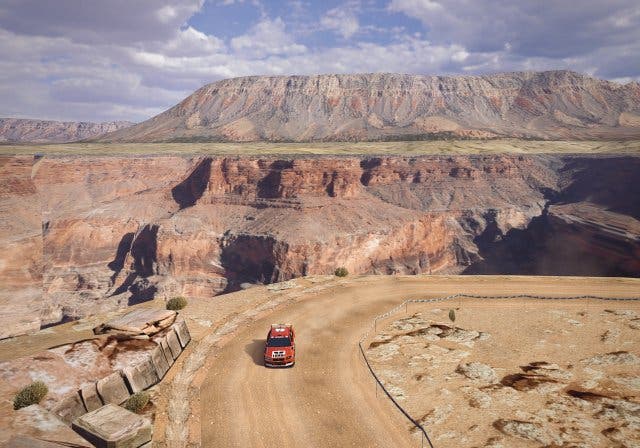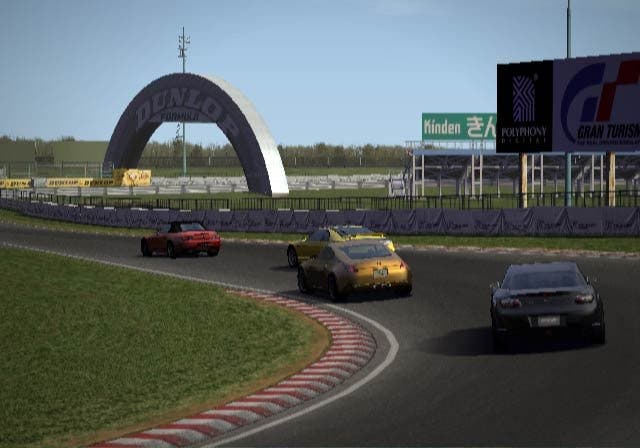Gran Turismo 4 Prologue
A limited edition - in more ways than one - but it's hard not to appreciate what Polyphony Digital is doing.
Order yours now from Simply Games.
"Gran Turismo 4 Prologue is an exclusive 'Advanced Skills School', designed with the most ambitious drivers in mind. It provides an opportunity to prepare for the imminent challenge of GT4 - an essential test-drive for potential champions." Signed, Kazunori Yamauchi.
Gran Turismo is traditionally associated with glorious visuals and a strict racing model, and Prologue certainly keeps up the tradition, but it's the manner in which it does so that may initially frustrate - and that arguably betrays Yamauchi's front-of-the-box pledge. It's immediately clear that we're dealing with a different breed of racer to the rank and file - where even the slightest mistake is punished by complete failure, and the traditional racing game rules are largely ignored in favour of a more realistic and consequently much more difficult racing model - but that's true of every Gran Turismo game.
Whatever the changes to the handling (and it's certainly a bit different), GT vets are going to be able to pick up on them fairly quickly. As such, the decision to send us all back to GT's version of primary school, forcing us to perform the same old stop-start routine on straight bits of track and telling us for the umpteenth time how to make our way around various corners, feels a bit misjudged. Kind of like dragging the whole class back a few years because little Jimmy can't do his multiplication tables. They can try to placate us by parading Vicki Butler-Henderson around on the Bonus DVD (be strong), and letting us opt straight for a time trial on any of the game's five tracks or racing against a few cars on a selection of them, but there's no escaping the fact that the real meat of Prologue is locked away in School Mode - and quite a way beyond the opening burnouts. And that's before we get onto whether there's enough meat overall.
Revision

School Mode - home to all the license tests - consists of 40 assorted challenges, some big, some small, which focus on every aspect of mastering the game's strict racing model - from simple things like braking distances and dealing with wide hairpins to more exotic challenges like double-apex corners, drifting round dirt track hairpins and racing off the start without traction control. Depending on the player's driving capacity, completing the challenge results in a different medal - where bronze is typically fairly easy to secure, silver is a bit harder but perfectly attainable, and gold requires a lot more effort.
The game's 'Arcade' mode, meanwhile, is little more than a time trial, allowing us to race round each of the game's five tracks using cars unlocked elsewhere, and take on a few AI controlled opponents on a selection of them. That means there's no question whatsoever of multiplayer or anything more exotic like high score uploads - even though GT4 will include such features. Nor is there any element of performance tuning - some of the license test challenges involve cars built around a particular balance (front engine and rear-wheel drive, for example), and you can turn off traction control and sometimes opt for different tyres, but there's no garage here and no method of tweaking any of the performance options. Doubly disappointing for veterans of previous titles.
Tourism

However once the player overcomes the initial disappointment of having to do all the things he or she has been doing in each of the previous Gran Turismos all over again, the rest of the package arguably makes up the distance. The five tracks were perhaps chosen for their diversity, each calling upon different skills and all very challenging in individual ways, whether it's the tightening blind corners of a steep hillside street course in Italy, the 90-degree turns in New York, the S-bends and hairpins of the two race tracks (Tsukuba and Fuji Speedway), or just the sheer difference of the rally option. Successful navigation of these is immensely satisfying, whether it's a box-shaped Toyota or a Dodge Viper rumbling under the thumbs.
The wealth of cars is another key factor - 64 in total are included, many of which have to be unlocked by making progress in School Mode. We're in no position to make a comment on the handling of most of them (although we'd welcome any offer to fly out and race cars with Polyphony - any chance, Sony?), but certainly, compared to each other and the way the same models are handled in other racing titles, it's a different kind of race whatever the car - the constants being the need to memorise track designs, consider the shape of corners and braking distances, and put up a level of sustained concentration that few if any other racing games would dare to command.
Tuning the driver

It's this more than anything that brings people back to Gran Turismo, and naturally it's key to Prologue's attraction. No other racing experience requires this much concentration, dexterity and in some cases mental stamina, but equally no other racer puts up such a convincing and consistent display and delivers the same sense of fulfilment when a difficult test finally yields. Through School Mode the game gradually exposes us to different components of a top driver's arsenal, and with each completed task it becomes easier to handle the collective rigours of five challenging courses.
But the question, really, is whether it ever becomes a learning experience for the average Gran Turismo addict, and fortunately the answer is probably yes. Unfortunately, it's a very subjective issue. There are at least several hours of key preparation here, as Yamauchi claims, for everyone - it's just a question of the level at which they start. For us, it was quite late on, and largely to do with overtaking manoeuvres (bashing other cars results in test failure, remember), and maintaining concentration over long periods. It took us several hours to complete a relatively simple 10-lap trip round Fuji Speedway, for example, even though Bronze didn't even require a fantastic drive - just a consistent one with minimal error.
Beyond that, time trials and single races against the AI won't be enough for everybody, but we spent many long hours attempting to nail decent times using our aggregated skills - certainly more hours than the average £20 game demands - and enjoyed retracing our steps through some of the individual license tests in search of Gold medals. Most gamers will soon find themselves religiously pummelling the same tests over and over in search of that elusive fractional improvement. It's definitely that sort of game.
Emotional Engines

It's also definitely a very pretty game, and part of our interest in playing it was borne of a desire to see those screenshots and movies in action, although ironically the available media probably doesn't do the game a huge favour - seen at the PS2's native res, rather than beefed up for presentation shots, the effect is notably less emphatic. It's still a mesmerising application of ageing PS2 technology though, building up a terrific sense of speed and authenticity, and it stands tall over its rivals.
Cars look gorgeous as they purr along, reflections and shadows dancing all over their magnificently detailed exteriors, which are all determinedly accurate thanks to Polyphony's association with the car manufacturers, while the tracks themselves are ridiculously good looking for the majority of the time. The texturing on the road surface is often of a very high standard by itself, and the way the sun glides over the bumpy tarmac with every turn improves the effect dramatically. What's more, each track has its own share of breathtaking moments - our favourite is probably the hairpin round a cliff edge on the rally course, particularly the way the shadowy underside of the rock face appears to scythe into the track as we approach.
Even the spectators are worth some praise - they may be largely static and quite flat, but some of them wave and some of them appear in front of the car snapping pics, leaping out of the way in the nick of time, and the effect is quite believable from the driving seat, even if it doesn't hold up particularly well under close scrutiny. On the whole the visuals are superb, as expected, and even the odd touch of clipping and pop-up makes little difference - a lot of PS2 racing game developers ought to hang their heads in shame after this.
The final straight...
It must be obvious by now that we have more good to say about Prologue than bad. There are many, many hours of gameplay here, and for those content to complete license tests and compete for Gold medals, and time trial their way around five diverse and entertaining courses, this is certainly worth the asking price. With a bonus DVD featuring a decent amount of Making Of and Behind The Scenes footage, it's arguably quite good value for money.
On the other hand though, a lot of people will be after racing, and Prologue simply doesn't offer enough of it. AI cars do feature in Arcade mode when toggled, and in the latter School Mode tests, but they're slow, spaced out and often fairly underpowered, and the lack of even a two-player mode means that hot-seating the 'Arcade' time trial is the most adventurous multiplayer possibility.
Furthermore, while it's true there is something in here for every manner of Gran Turismo fan, the delivery is arguably somewhat flawed, if only in terms of arrangement, and as a result many people will find that there's a lot here to enjoy, but also a lot to endure. A fitting conclusion would be that your mileage may vary, but that some measure of the journey will happily captivate you from now until Gran Turismo 4 eventually arrives. Ultimately though it's a question of how much tutelage you reckon you need.


